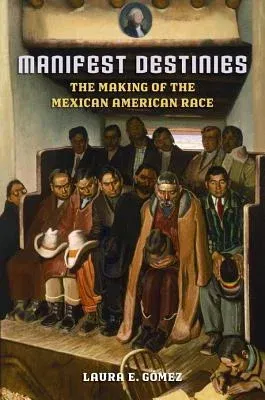In both the historic record and the popular imagination, the story of
nineteenth-century westward expansion in America has been characterized
by notions of annexation rather than colonialism, of opening rather than
conquering, and of settling unpopulated lands rather than displacing
existing populations. Using the territory that is now New Mexico as a
case study, Manifest Destinies traces the origins of Mexican Americans
as a racial group in the United States, paying particular attention to
shifting meanings of race and law in the nineteenth century. Laura E.
Gómez explores the central paradox of Mexican American racial status as
entailing the law's designation of Mexican Americans as "white" and
their simultaneous social position as non-white in American society. She
tells a neglected story of conflict, conquest, cooperation, and
competition among Mexicans, Indians, and Euro-Americans, the regions
three main populations who were the key architects and victims of the
laws that dictated what ones race was and how people would be treated by
the law according to ones race. Gómezs pathbreaking work-spanning the
disciplines of law, history, and sociology-reveals how the construction
of Mexicans as an American racial group proved central to the larger
process of restructuring the American racial order from the Mexican War
(1846-48) to the early twentieth century. The emphasis on
white-over-black relations during this period has obscured the
significant role played by the doctrine of Manifest Destiny and the
colonization of northern Mexico in the racial subordination of black
Americans. A native New Mexican, Laura E. Gómez is Professor of Law and
American Studies at the University of New Mexico. She is the author of
Misconceiving Mothers: Legislators, Prosecutors, and the Politics of
Prenatal Drug Exposure. In her discussion of the role of law in the
creation of Mexican Americans as a racial group Gomez tells a convincing
story of conquerors manipulating the conquered. -The Santa Fe New
Mexican Gómez sets out to write an antidote to historical amnesia about
the key nineteenth-century events that produced the first Mexican
Americans. A law professor at the University of New Mexico, Gómez takes
a three-pronged approach: she looks at Chicano history via sociology,
history, and law, using New Mexico as a case study. At the heart of the
book is the idea that Manifest Destiny was not, according to Gómez, a
neutral political theory. Rather, it was a potent ideology that endowed
white Americans with a sense of entitlement to the land and racial
superiority over its inhabitants. -La Bloga

